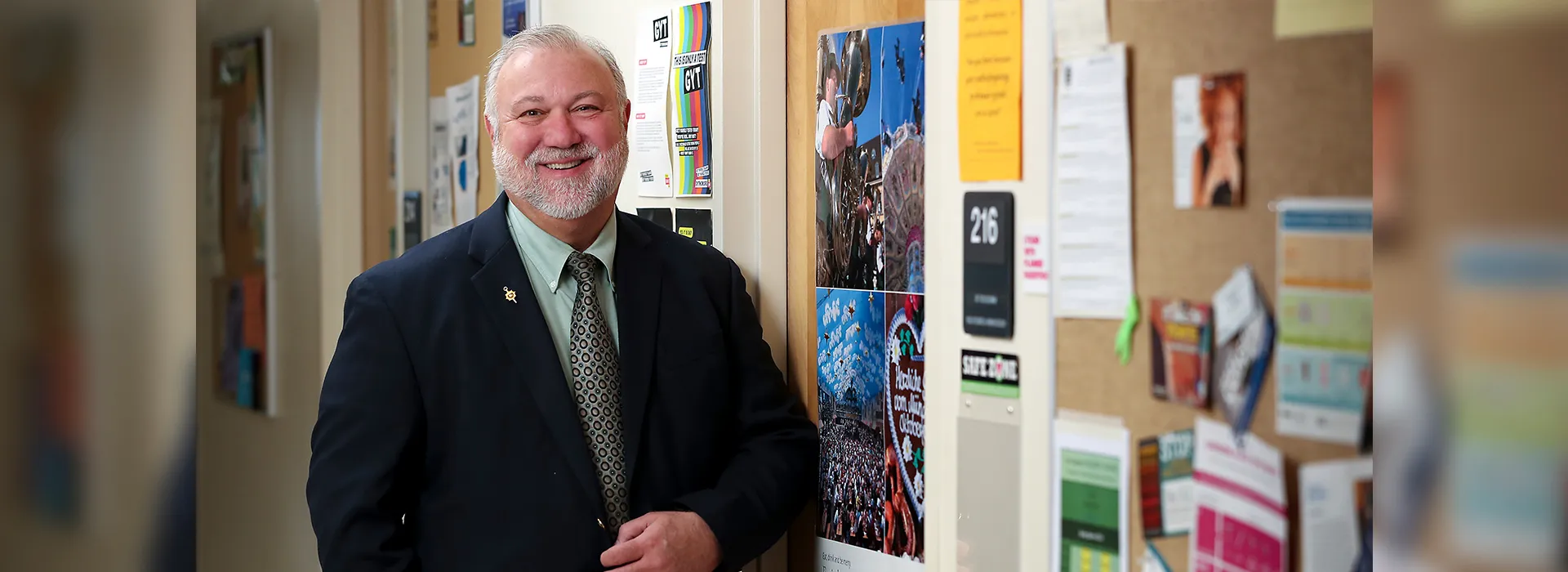Joe Gutierrez Office of Strategic Communication (909) 537-5007 joeg@csusb.edu

One former student said he remembered everything Ted Coleman taught him about emergency medicine as he responded to a car accident in the mountains of northern Arizona: “It was your voice in my ear, telling me what to do each step of the way.” Another told Coleman he was “that little man on my shoulder” throughout his graduate studies in physical therapy.A third, now an adjunct faculty member in Cal State San Bernardino’s Department of Health Science and Human Ecology, still calls him by a humorous nickname, “Dr. Pivot,” due to Coleman’s influence when he was an undergraduate student in the 1980s. Hearing these student success stories “does my heart good,” said Coleman, a CSUSB health science professor. “We have a core of young people who are solid and strong, and they’re going to do just fine. They’re going to go way beyond where we take them.” His contributions and commitment to the college-health field were recently recognized when he was named an American College Health Association (ACHA) Fellow. This distinction – the first ever for a CSUSB faculty member – acknowledges Coleman’s professional accomplishments as well as his leadership and service. ACHA, established in 1920, is a volunteer professional organization that seeks to advance the health and wellness of college students through advocacy, research and education. “ACHA could not have flourished for over nine decades without the commitment and leadership of professionals such as Ted, who have voluntarily chosen to help lead and chart the course for college health over the years,” ACHA President Stephanie Hanenberg wrote in a letter announcing Coleman’s honor. Department Chair Claudia Davis added, “Ted brings a wellspring of knowledge to our students, and this coveted award highlights his commitment and leadership in the field.” This is not the first time Coleman has been honored by ACHA. In 2012, Coleman – then the department chair – was honored as the recipient of the Miguel Garcia-Tuñón Memorial Award in Human Dignity. This ACHA award acknowledges individuals who promote the appreciation of human differences. Coleman has served in various ACHA leadership roles since 2007, including longtime chair of its LGBTQ+ Health Coalition, two terms on its board of directors, treasurer, and member of the ACHA Executive Committee.Keeping abreast of the college health field and collaborating with colleagues across the country has been “a wonderful experience,” he said. “I get the chance to rub shoulders not only with physicians and nurses, but also with psychologists, counselors, pharmacists, health educators – a whole variety of competent professionals,” said Coleman, who also serves on the executive board of the Center for Aging at CSUSB. As an ACHA board member, he spearheaded an initiative to draft a position statement in support of marriage equality that “recognizes that denial of equal civil rights can contribute to diminished health and quality of life.” Coleman said mentoring students – especially first-generation ones – to become more aware of health and wellness issues that affect them is critical. Such issues include family planning, gender identity and human sexuality. “It starts at an early age,” he said. “Helping young people become aware of their own responsibility and obligation to monitor and promote good health will serve them and their families for generations to come.” Seeing students develop from undergraduates to professionals has also been a particular highlight for Coleman. He recalled meeting Dolores Mancha, a future student at a campus event who inquired about the health science department. Mancha changed her major to health science, graduated with a bachelor’s in public health education, and was later named Outstanding Graduate Student in the Master of Public Health program. She also took Coleman’s stress management course at the Hessen International Summer University in Fulda, Germany, and presented at the national ACHA conference in Washington, D.C., last year. “They’re the ones who make our jobs so rewarding,” Coleman said. “They’re not just doing what they have to do to get by; they’re doing some really worthwhile things. They’re going to stand out and distinguish themselves as leaders in their field. I just love that.” For more information about the association and its Fellows, visit the ACHA website. For more information about CSUSB’s public health programs, visit the Department of Health Science and Human Ecology webpage. For more information on Cal State San Bernardino, contact the university’s Office of Strategic Communication at (909) 537-5007 and visit inside.csusb.edu.